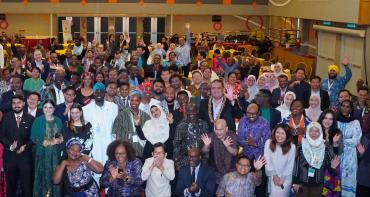The Youth Development Index, which charts the social, political and economic situation for young people in 170 countries, had its next iteration reviewed by a panel of policy experts.
The Youth Development Index, which charts the social, political and economic situation for young people in 170 countries, has been welcomed by a high-level panel of policy experts - ahead of the launch of its 2016 edition.
Over 20 leading experts from the United Nations, OECD and World Bank, among other organisations, met at the Commonwealth Secretariat’s headquarters at Marlborough House in London last week to review the next iteration of the ground-breaking index, first published in 2013.
The Youth Development Index, a research initiative of the Commonwealth Secretariat, seeks to address a global gap in data on young people’s development in areas such as health, education, employment, and civic and political participation. The second iteration of the index will be published in Spring 2016.
Katherine Ellis, Director of Youth at the Commonwealth Secretariat, welcomed the input and constructive feedback of the policy experts and academics from government and civil society participating on the Youth Development Index’s Technical Advisory Committee, which met between 27 and 29 January.
“Since it was launched in 2013, this pioneering tool has for the first time created a holistic picture of young people’s development progress around the world, and inspired a global debate on the importance of gathering youth-specific data. It is giving governments the information they require to promote evidenced-based youth development policy-making,” Ms Ellis said.
“The index is even more relevant today in the context of the adoption of the Sustainable Development Goals, as it provides a robust framework for monitoring the successes of countries in supporting their often large youth populations. The data revolution that the Youth Development Index is part of will be instrumental in the achievement of the SDGs.”
During the three-day meeting, the panel was treated to a preview of the 2016 report’s main findings, and in turn gave recommendations to support the next iteration of the index, its methodology, and the overall youth data collection framework.
One of the experts, Dr Claudia Stein, Director of Information, Evidence, Research and Innovation at the World Health Organization, commented: “What doesn’t get measured doesn’t get done. If policymakers don’t have data, indicators and targets to work towards, progress is not even measurable.” It was a sentiment shared by many of the experts.
Dr Jo Boyden, Director of Young Lives and a Professor in International Development at the University of Oxford, added: “The YDI is a really important proxy for how young people are doing across different aspects of their lives. It is a great political tool that can rally policymakers.”
Dr Adil Najam, Dean of the Pardee School of Global Studies at Boston University, and Lead Author of Pakistan’s 2016 Human Development Report, said: “The YDI gives a signal to leaders that young people are important and it puts youth into the policy conversation.
"If people are talking about youth, if they’re talking about ways to make the lives of young men and women better, then you’ve done your job.”



